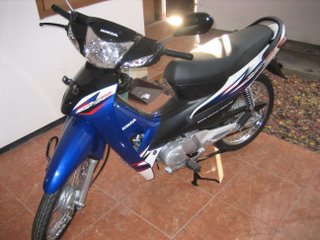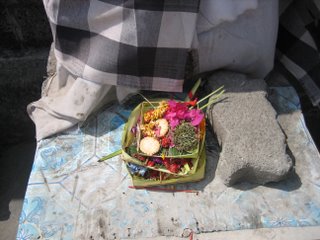Indonesia: Life In The Islands
Monday, October 23, 2006
Sunday, October 15, 2006
From the Jakarta Post:
Unease in Aceh as Morality Police Crack Down
The teenagers were on a weekend camping retreat in the rugged hills of the province at the northwestern tip of
“They were hitting the tents and screaming, ‘Get out, get out!’” says the 18-year-old Islamic boarding school student, who wears a demure long skirt, long-sleeved blouse, and a pastel-colored headscarf, or jilbab.
The men lectured the dozen girls on the risk of committing the sin of khalwat—being illicitly close to a man—before lining them up for identification at the nearest village.
The boys were discreetly taken to a prayer hall, away from prying eyes.
“We felt like prostitutes,” Purnama says, “Villagers were watching us, laughing. All of us girls were crying.”
Purnama is a rare voice willing to criticize the implementation of sharia, or religious law, in Aceh, with few others complaining here for fear of being seen as bad Muslims.
The pace of acceptance of sharia has accelerated across Aceh while many Indonesians elsewhere, who largely practice a more moderate version of the faith, follow developments carefully, some with alarm.
Even the UN’s World Food Program (WFP) has been targeted. The religious police—known formally as Wilayatul Hisbah (WH), taking their name from
“There was nothing to find and they found nothing,” says WFP spokesperson Charlie Higgins of the incident, which highlighted the lack of clarity surrounding just how non-Muslims are affected by sharia.
Aceh has for centuries been a staunchly Muslim heartland, with separatist rebels fighting for independence from
Islamic courts were given approval to extend their reach to criminal justice in 2001, when a special autonomy law was passed by
Today public caning and fines are used as punishment for the consumption and sale of alcohol, gambling, and khalwat.
Acehnese refuse to speak out about sharia, rights activist Aguswandi says, because they “are scared of being accused of being anti-Islam, of being targeted, and also because there is no support for a different voice in Aceh.”
For Acehnese women, wearing the veil has never been a tradition—but it may well soon be.
“Allah asked you to wear the jilbab, it’s a sin!” lectures a member of the mobile sharia police to a bare-headed woman sitting at Banda Aceh’s ferry terminal.
Raja Radan, the supervisor of Banda Aceh’s 45-man morality team, insists patrols are only aimed at protecting them from sin.
The head of the sharia department in Aceh, Al Yassa’abubakar, says that sharia “helps create a conducive atmosphere for the economy, prosperity, and justice in Aceh. People can work with peace of mind.”
And By The Way...
...I'm going to Bali and Lombok tomorrow for two weeks until Lebaran. Gunung Agung, Lovina Beach, some more Kuta and Legian, maybe some boating and snorkeling in Lombok--we'll see!I Finally Buka Puasa (Well, Sort Of)
Today I went to Pak Tedy’s house for some good old fashioned home cooking—following the daily fast of course. Due to the lack of food in my house I was all set to fast as well—I cheated in the morning with a cup of coffee (but only because Pak Tedy was two hours later picking me up!) but I didn’t eat anything.
Instead of going right to his house we went to
Then lunchtime came and Ibu Tedy put a delicious plate of French fries straight from the oil in front of me. I protested weakly, and then ate more French fries than anyone should ever permit themselves in one sitting. I also ate some
Apparently the rainy season started TODAY, because right as we were leaving to practice riding motorcycles it started to downpour. It was so intense that you just heard a steady pounding on the roof. I assumed motorcycle riding was shelved, but no! We just rode them through the different rooms of the house practicing hairpin turns. Very resourceful.
After that I watched Malang TV for a while, which was showing a rather fascinating documentary on berang-berang, or otters. I found it interesting that the singular TV station for the town of
Layne came over before dinner and the rain stopped, so we went to the parking lot of a mosque and practicing shifting and using our brakes. We’ve been riding motorcycles for three weeks now and today was the first time anyone told us that there is a foot brake in addition to the handbrake. I’d been wondering why I kept skidding out and coming perilously close to hitting walls when I try to stop. We raced around for about an hour, to the endless amusement and chagrin of several boys dressed in prayer attire who were waiting to pray Mahgrib. They thought we were hysterical at first, but after a few skids and close calls, they sat and watched us with trepidation, screaming “hati-hati!” (caution!) if we started to come anywhere near them. They gave me a safety lecture when I was done. They were about fifteen.
Buka puasa was a bit of a letdown. I had thought there would be some whole song and dance, maybe some prayers or chanting to celebrate the end of the fast, but people just waited until
Pak Tedy and his wife very candidly informed us that “durian is power!” and it increased their libido—why else would they have five children? They thought that was hilarious (they also thought it was funny to give all of their children names that start with "A"). After many hints and many many family photos we were on our way home, with boxes of chocolate, durian breath, and promises to go everywhere from
Some Thoughts at 1 AM
There are rats in my ceiling, and I can hear them running around.Something bearing a very strong resemblance to a train just went down my residential street.
Reading the magazine REFORM (A MAGAZINE FOR REFORMERS) I came across this insight: "Men become addicted to pornographic materials, begin to desire more explicit or deviant materials, and act up acting out what they have seen." This in regards to supporting the so-called "Porn Bill" Indonesian legislators are trying to pass to ban pornagraphy. Comments, anyone?
Thursday, October 12, 2006
Wednesday, October 11, 2006
A Delicious Salad Part II
1. The dry season is ending in
PT: Caitlin, my friend who is very handsome wants to meet you.
Me: Hmm, OK, what does he do?
PT: Yes.
Me: That wasn’t a yes or no question…umurnya? (How old is he?)
PT: 35.
Me: Um, what? I don’t want a 35 year old pacar (boyfriend/girlfriend).
Suharyadi: No, it’s OK. Younger women marry older men here.
Me: Yeah, I’m not really into that. What would we have in common?
S: You could get married.
Me: OK true, we could have that in common. What does he look like?
PT: He has brown skin and a mustache.
Me: Gross, no mustaches. I hate them.
They stare at me and I belatedly realize they both have mustaches.
Me: I mean, for a boyfriend…they’re really cool in general. I wish I had a mustache.
Everyone smiles.
PT: So you want to meet him?
Me: Umm…munkin nanti (maybe later).
Later in the same discussion I said I wanted to be an istri muda (young bride), and everyone in the office laughed. Turns out that istri muda here means the second wife a man takes after his first has given birth to all his children. She’s usually younger than me, capped around 21. Suharyadi kindly informed me I could not really be an istri muda anymore. Oh damn, and I had my heart set on marrying a man twice my age who already has a wife and four kids. Better think of plan B.
Indonesian KFC does not have biscuits
Indonesian McDonald’s does not have Sweet n’ Sour sauce
Sunday, October 08, 2006
More Themed Writing
A few weeks ago I wrote about how I had my students compose lists of words they knew in Indonesian and English for me to study. Around the same time, I was noticing how many of them believe in ghosts. Well, I just found one vocab list that combines both of these:die: mati
mortality: kematian
dead man: mayat
graveyard: kuburan
frog: katak
ghost: hantu
hell: neraka
paradise: surga
paranormal: dukun
god: dewa/tuhan
transitory: kefanaan
I'm mostly just impressed that she knew the word transitory.
Pesar Burung

Layne and I went to the Malang bird (and other animal) market this morning. Here's picture of one of the many pet squirrels (?) running around the market. The following is a partial list of the animals we saw:
various bird species I don't know the name for
baby chicks dyed pink, green, and yellow
giant ravens
HUGE cats from Norway--I thought they were baby tigers when I first saw them...they're triple the size of normal cats
monkeys
squirrels
grubs
rabbits with very veiny ears
scorpions in a cage with no top
fish
one lone puppy--we played with him for a while, but it was hard to get past the giant dead turtle on top of his cage
an extremely large lizard of some sort that was not caged
many snakes
huge turkeys crammed into tiny cages
the largest bats I've ever seen, hanging upside down in their cages--they were bigger than most cats (although not the HUGE cats mentioned earlier on this list)
some kind of weasel/ferret animals
doves, pigeons, very dirty ducks
Some of the animals were in cages, some illin out...there were a few snakes out, squirrels and birds hanging around, and of course, the giant lizard. I really loved the puppy and wanted to take him home, but the owners of my house are Muslim and think dogs are unclean--so I might have to settle for one of the HUGE cats instead.
Friday, October 06, 2006
Confrontation at Plaza Dieng
My first day in Malang (and even during orientation in Jakarta) certain rules regarding male/female interactions in Indonesia were made very clear. Men cannot be in your house alone with the door shut, they shouldn't be in your house after dark, and you shouldn't go over a man's house alone. Some cities are definitely more liberal than others, but Malang is pretty conservative. My neighbors and the teachers are my school have told me that "things aren't like America here" and "my boyfriends" (special emphasis was placed on the plural) shouldn't sleep over my house. It's pretty obvious what their preconceptions of Americans girls are.I mean, I'm fine with the guidelines--this is a Muslim community, and there are certain behaviors that everyone knows about...which is why is makes me SO ANGRY when some Indonesian men try to get me to violate the rules. Once they hear I'm from America, the next question is almost always, "Can I have your handphone number?" After I say my phone is from the US Embassy and only for emergencies, then it moves to, "What is your address? Let's go to your house and talk." It really makes me feel sick sometimes, because obviously these men have watched American movies or heard rumors about sex-crazed American women and they think that I'll do anything. At Plaza Dieng today (Malang's poor imitation of a strip mall), I finally summoned all my Indonesian and had it out with one of these men:
Note--this conversation takes place in very slow Indonesian, some broken English, and some forceful pantomime on my part. This man chased me across the street and up the mall stairs to talk to me.
Man: Where are you from?
Me: America.
Man: What's your name?
Me: Caitlin...(awkward silence) What's yours?
Man: Willy
Me: Senang bertemu Anda...Saya tidak tahu Bahasa Indonesia (nice to meet you; I don't know Indonesian).
Willy: I like your hair.
Me: Thanks...OK Willy, I'm going to get a manicure.
Willy: Do you want to meet up later?
Me: Ummm...saya tidak mengerti (I don't understand--even though I obviously had)
Willy: Me, and you, go to your house now.
Me: Apa? Kenapa? (why)
Willy: To hang out...
Me: My neighbors said I can't have men over my house.
Willy: Tidak apa-apa (no problem), come to my house.
Me: (losing my temper) Why you say that to me? If I Indonesian girl, you don't say that to me.
Willy: Apa?
Me: Anda tahu yang tidak benar (you know that's not right).
Willy: You are talking about the Javanese way. I'm from Papua. Papuans can go to your house.
Me: Do you think I'm stupid? Anda tidak bagus (you not good).
Willy: Come on...
Me: You are saying this because I'm foreign. Saya sedih dan marah (I'm sad and mad--the most forceful words I know).
Willy: You are not Javanese. Come to my house.
Me: I am Javanese for a year. (A lightbulb goes on in my head) Saya menikah (I'm married).
Willy: Tidak apa-apa.
Me: Saya tidak suka Anda! Saya tidak mau bicara dengan Anda! (I don't like you! I don't want to talk to you!)
Willy spits out a string of Indonesian and I run away.
I'm glad I at least said something to him. Maybe he'll think twice now before assuming all foreigners have loose moral boundaries. I have noticed that a vast majority of men who treat me like this are not from Java, so maybe the "rules" are just Javanese--but I like them. I think I'm going to buy a cheap ring and just tell everyone I'm married from now on.
Miss Caitlin the Communist
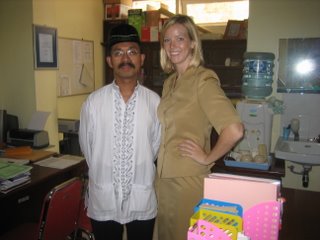
Don't be jealous that my uniform is so cool...although Pak Tedy's outfit puts me to shame. This picture is also demonstrative of the extreme height differential between me and everyone I meet.
Linguistic Laziness
I love my students, but some of the classes have to be tricked into trying. Most of the Indonesian English teachers always translate for them, so they’re not used to having to figure out instructions in Bahasa Inggris. Today we were working on listening comprehension using song lyrics. I very unwisely chose the song “Over My Head” by The Fray, which apparently was much too fast for anyone to understand. Nervous they were failing some sort of quiz, the students freaked out and screamed “APA?” (WHAT?) during most of the song. They know English but sometimes they just don’t want to use it, which can be very frustrating. Here’s an example of a dialogue with one especially unwilling class:
Me: OK, please listen to this song and try to understand it. We’re working on listening comprehension.
Students: Apa?
Me: Listening comprehension.
Students: (murmur to each other in Indonesian) Apa?
Me: Are you serious? LISTENING (mime sounds going into my ear)
Students: Ohhhh, mendengarken.
Me: What is menengarken in Bahasa Inggris? Say the word listen.
Students: Apa?
Me: Say what, not apa! Do you understand anything I’m saying?
Students: Yes, of course.
Me: Raise your right hand if you understand what I’m saying.
Five kids raise their hands.
Me: OK, great.
A lot of times they’re just being lazy, and I have proof. After pretending not to understand the word listen, I assumed they wouldn’t know the word disengage.
Me: (very slowly) disengage—do you know the word disengage?
Boy in front: yes, yes, we know
Me: please define it then
Boy in front: separate; not together; no longer engaged.
Me: (incredibly impressed) I cannot believe you just gave three definitions of that word. Gold star for you.
Boy in front: (frightened by his knowledge) Apa?
I switched to Beatles songs and they perked up. They CAN do everything I ask, they just choose not to sometimes. After we had figured out the lyrics to “Hello, Goodbye,” I asked if they wanted to sing the song together (most of them had been singing it anyway). They said no, which was fine, and then someone called my name in the hallway so I left for a second. I think the poor kids though I left because I was mad they wouldn’t sing, because when I came back in a minute later, they broke into a warbling and off-key version of The Beatles, looking at me anxiously. Adorable.
Ramadan
The Islamic fasting month of Ramadan began almost two weeks ago. Until Lebaran and Idhul Firtri, the holy days marking the end of the fast, Muslims cannot eat, smoke, or engage in impure thoughts or actions during the day. I learned about Ramadan in elementary school (where I remember believing that Muslims didn’t eat anything for a month), but unless you’re in a Muslim country you don’t realize what a giant deal it is. The mosques, my ever-present alarm clock, now operate almost all day long. The teachers at my school explained that because of the piety required for fasting month, extra Arabic prayer and Indonesian sermons are broadcast throughout the day.
At
It’s strange to see brands I consider American, like McDonald’s and Aquafina, showcase ads and commercials for Selamat Puasa (good fasting). McDonald’s has a whole separate campaign which focuses on getting people to break the fast with their fast food. It kind of reminds me of the ridiculous McDonald’s commercials from the
I try to respect the teachers and students at my school by not eating or drinking anything while I’m there. But sometimes the teachers insist that I drink water, and then stare at me while I do it. I asked Suharyadi the other day if he thought I was weak for having to drink during the day, and he admitted that yes, he did. So I almost think that watching me drink or eat something makes the people who choose to fast feel prouder of their endurance. I mean, I’m not from a tropical climate! I have no idea how the kids can sit in all class all day without even drinking water, but I guess they’ve been doing it since they were young. The year you first make it through a day without eating is considered a very proud time in a child’s life, and lots of children ask their parents to be allowed to fast for the whole month—according to Ibu Moerdiati. Some of my students seem less than pleased to be deprived all day. I want to ask them about it, but I feel like it’s a touchy subject.
The reason I’ve had so many days off recently is because the first week of Ramadan was spent studying the Qu’ran and practicing various prayers and practices Muslims need to know when they make the pilgrimage to Mecca. I went and watched one day and it was really fascinating. It’s disconcerting for me to see my goofy students, the ones who laugh and make fun of each other (and me!) act so pious and prayful. Sometimes I look into the musholla (prayer room) at school and the students inside are so deeply engaged in the prayers and rituals they don’t even see me. Again, this is not a blanket statement—there are some kids who just seem to be going through the motions, and would rather have the days off than spend them studying their (their parents’?) religion.
Pak Tedy has asked me if I want to buka puasa at his house next week, and I think I’m going to. That would mean fasting for a few days, but I’m out of food in my house anyway and it’s an excuse not to go to the grocery store. Also, I’ve been wanting to get up and go eat breakfast on the streets at
Apparently for Lebaran, SMA 3 has some kind of celebration at the school that I was invited to. I’m not sure exactly what is being celebrated and what we’re going to do, but I think it might be a final night of breaking fast together. Part of Lebaran is getting new clothes (?) so today Principal Tri bought me a SWEET turquoise batik outfit. I’m taking it to a tailor this weekend, but it’s going to be unbelievably funny—the top is covered with lacy flowers and the bottom is batik print. Like most of the clothes the school gives me, it’s extremely form-fitting—I can’t wait to prance around in it. Selamat Puasa!
Wednesday, October 04, 2006
Ubud Writer's and Reader's Festival

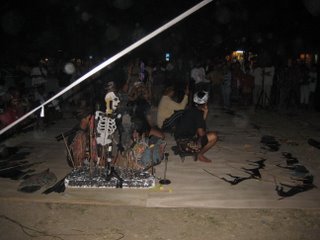
A few months ago, I read in a tour book about the Ubud Writer’s and Reader’s Festival, a four day international event held in Ubud,
The first session we went to was called “After the Wave” and it was about the ongoing process of rebuilding and recovering after the December 2004 tsunami. First they showed the photographs of John Stanmeyer, a famous photographer who had taken pictures at various sites in Aceh (the province hit most severely by the wave) right after the tsunami and then one year later. It was really striking to see the photos juxtaposed next to one another—for example, one was of children running across a field to get food and supplies from an aid helicopter, and the second (or “after”) picture was of children running across the field again, but this time simply chasing after the ball they were playing with. Some of the other pictures featured freshly dug graves; then a year later, the same spot overrun with grass and flowers.
After the photos, two Achenese poets read some of their work. The first poet, Fozan Santa, had written a series of poems labeled “Black Water” about the tsunami. I could only understand the translations, which were fairly simple, but the poems were much more rhythmic in Bahasa Indonesia. The second poet, Reza Idria, read only one poem, also about the tsunami. Both of the poets talked about how, after the tragedy, they saw their focus in writing shift away from the conflict in Aceh and toward rebuilding. Prior to the tsunami, for 29 years Aceh had been experiencing severe civil unrest as the province attempted to split from
The moderator asked if Fozan thought the peace had come about as a result of the Achenese pulling together after the tsunami. He very honestly answered that no, he thought that having the attention of the world focused on Banda Aceh for the tsunami aid efforts simply made it impossible for the government on either side to continue their bloody war against one another. I thought both poets raised some excellent points about foreign aid to the victims as well as the role of writers in portraying the feelings of their people. Recently, the head of a giant company responsible for rebuilding much of the province was taken hostage by disgruntled survivors whoaren't pleased with the pace of the rebuilding process. The poets saw events like that as the reason they must continue to write for their province.
After the Achenese poets spoke, the attention turned to Elmo Jayawardena, the head and founder of the Sri Lankan organization AFLAC (The Association for Lighting a Candle). After the initial shock of the disaster wore off in January of 2005, Elmo started AFLAC for orphaned children. He told one story about a boy he found by the shores of
“This boy’s father had been swept away in the tsunami, and his mother had been driven mad by the tragedy. He was a little boy, only six years old, with two younger brothers to care for. Every time I looked at him in January, he just cried, and cried, and cried. In April, when we went back to monitor the programs and check on the progress, we saw the little boy again. And every time you looked at him, he just cried, and cried, and cried. And that is the tsunami.”
The quote for Elmo’s association is: “It is better by far to light a solitary candle than to curse the darkness.” His individual work in creating the organization, which also works to teach swimming to poor Sri Lankans who live by the coast, is really a testament to that motto. I found him an incredibly inspiring and kind man, and I talked to him briefly after the session about teaching English as a foreign language.
The second session was a panel discussion about the emerging role of
The third and final session we attended was called “Footprints Across the Globe” about travel writing. It was interesting in some ways, but I don’t think I would read the books of a few of the panelists. After the session was over, we found our way to some sort of book launch/singing/free wine and food event down the street. Some Australian woman was launching her book and CD, both of which looked pretty terrible, and then she drunkenly bellowed some of her own songs into the microphone. Delicious.
As it started to get dark, we made our way to the Ubud Soccer Field for “Skateboard Wayung Kulit” apparently a modern interpretation of the Indonesian puppet show. It was hysterically funny. Someone must have told the puppeteers that there were foreigners in the audience, because they pretty much yelled out any English word they knew at any point. There would be strings of Indonesian, and then “COCA-COLA!” More Indonesian, then “WE MUST DRUNK.” I couldn’t follow any of the storylines, but there was certainly no skateboarding involved—there were, however, some massacre scenes featuring wild animals and lots of hooting and yelling from the audience.
For the last event of the night, we went to Warung Opera for some kind of Indonesian poetry slam/gamelan music/chanting. I missed the first hour because I was so entranced by Skateboard Wayung Kulit, but I did get to see some funky music and chat up a really interesting dude, Bob, at the bar. Bob is about 60, has lived for twenty years in
Tuesday, October 03, 2006
Tanah Lot
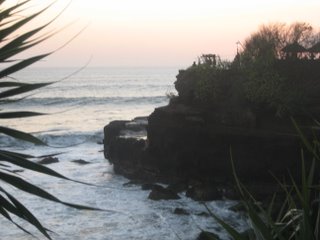
The second day was more of the same in terms of surfing and nasi goreng. A man I had met on the beach the night before, Agung, told me about a ceremony that night at Hindu Pura Tanah Lot, a Buddhist temple located right on the beach. To commemorate those who died in the two
Since we were too cheap to actually pay for seats, the few first minutes at Tanah Lot were spent jockeying for good positions, running around the venue, climbing up poles, and going underneath the grandstands. I watched the beginning of the dance standing on the side of a cliff next to the water. Five thousand dancers in Balinese dress of checkered black and white sarongs, moved into position. Gamelan music was playing as the dance began with a small number of performers. When the sun started to set over the ocean the giant mass of dancers surged forward and the real show began. Here I’m going to lift a phrase from the CNN article about the event, since it explains the origins of the performance better than I can: “The Kecak is among the most dramatic of Balinese dances. Rooted in the so-called sanghiang trance dance and drawing on elements from the Hindu epic Ramayana, it is a mix of theatre, music and dance.”
For part of the tribute I moved away from the cliff and watched the dancers close up on a screen that was positioned behind the stands. The precision of the dance movements and the expressions of the dancers were very striking. It was incredibly dramatic to watch 5,000 people clap in unison and yell “Cak Cak Cak.” The music was very dark and rhythmic, and it stayed in your head. As full darkness came over the temple, all of the dancers lit torches for the finale, the triumph of Ramayana. At this point most of the security had abandoned their posts, so I ran down to the very front near the stage and watched as the event concluded and the thousands of dancers began to file out, throwing their torches into the ocean. Just as everyone was leaving and the tribute seemed complete, fireworks lit up the night sky, illuminating the ocean and the temple in an awesome finale. You can read more about the event here.
After our driver managed to pry us away from the temple, we drove back into town, ate dinner, and explored some of the shops and restaurants in the Kuta area. It’s always so cool in
A lot of Balinese men also wear their traditional dress around every day. This consists of a sarong, an (optional) shirt, and some sort of Balinese do-rag that I don’t know the name for. They sit around outside of stores and houses with their friends, just hanging out in their skirts. I really love it. Balinese people, like many Indonesians, are also very affectionate with their friends and family. It’s not unusual to see two dudes walking down the street holding hands or with their hands on each other’s waists. It’s just a way of chilling out and being comfortable with each other. In my school, the teachers always touch me when they talk to me. Some of the younger university students who teach there always hold my hands or arms when we’re talking. Since I’m not the most touchy-feely person it took some getting used to, but now I grab hands and waists with the best of them.
One more thing I noticed about Balinese men (besides how unbelievably attractive they are): in
Monday, October 02, 2006
Pertama Kali di Sorga (First Time in Paradise)

Getting to
On the bus I sat next to a very interesting character named Nana. She spoke excellent English (besides using the phrase “or something like that” after literally every sentence she spoke, and I’m not kidding) and seemed to see me as some kind of instrument for the purging of her soul. Ramadan began on Sunday and, as Nana informed me, followers of Islam should apologize to those they have offended and try to make things right. Stemming from this explanation, Nana talked for the next four hours about a situation involving her eye surgeon, his wife, and how the wife had disrespected Nana by showing disdain for her house and refusing to answer numerous text messages. I sat and nodded encouragement and reassured her that yes, it was rude to stop being someone’s friend because their house wasn’t as nice as yours.
I guess this response appealed to Nana immensely, because by the time we stopped for dinner she had invited me to sleep at her house when we arrived in Denpasar. I was about to say no—after all, in American you would never go to the house of someone you met on a bus and sleep in their daughter’s bed—but in Indonesia, there’s really no reason to refuse. People see having guests as an honor, and it seems almost unheard of that someone would steal from you or invite you to their house under false pretenses. I also hadn’t given much thought to where I was going to sleep or even go when I stepped off the bus in Denpasar at
Once we arrived in
My cab rolled down the streets of the Kuta region and then we drove along the beach. I know people say that
Flashback: We Naik a Bus to Yogya
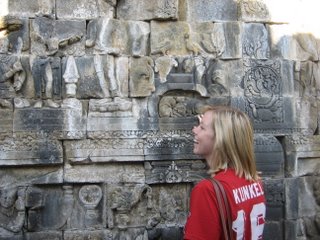
naik: 1. climb, ascend, go on (up). Pesawat itu gagal—The plane failed to get off the ground.
Everyone knows you shouldn’t judge a book by its cover, but when a bus pulls up and the name of the company written on the side is “Rizkey Travel,” that’s someone trying to tell you something. Layne and I had been deceived into choosing the front two seats next to the driver for their “safety” and “comfort.” As it turns out, the other six seats in the van recline and are fairly cushy—while the seats in front are located about 10 inches back from the dashboard and close enough to the driver that every time he shifted gears he copped a feel of my upper thigh. There was also a mysterious black liquid dripping from a murky bottle located under the air conditioner, but that was the least of our worries.
In
There were several unscheduled and seemingly purposeless stops along the way to Yogya. Occasionally we would get a new passenger or some gas, but sometimes it seemed like the driver just wanted to talk to some random men at gas stations or rumah makan (restaurants—literally “eating house”) and smoke a cigarette with them. On the way home, our driver picked up a man (his friend, maybe) and we drove him about 20 minutes down the road (and out of our way) for fun. We also got out at one gas station to get money from the ATM and the bus driver took off again without us—luckily Layne was close enough to run and shout at him to stop.
Besides the excitement of transit, the weekend was great. Since we were all English starved, most of the weekend was spent speaking as fast as possible and filling each other in on school placements, houses, and travel plans. The first day we explored a little around Yogya, looking for some batik (Indonesian fabric painting). Having read her Lonely Planet extensively, Layne predicted that someone was going to tell us about the “last day” of an art exhibit held by “art students” and encourage us to go there. Sure enough, a man picked us up and showed us to a gallery that was showing various batik paintings. Coincidentally, it was the last day of the exhibit (although in all fairness it was the day before the start of Ramadan, so that may have been true) and started off with some ridiculous prices, seducing us with offers of tea and explanations on how to make batik. Luckily, most of us have mastered our numbers by now so we could bargain fairly well, although I’m sure we still paid triple what they’re actually worth. I bought a painting of red flowers that’s striking against the light.
After haggling, we decided to go to
To reach
Once we were inside, however, it was definitely worth it. We hired a guide (Buddhi) and he gave us some history of the temple. Seen from above, the seven levels represent the seven stages of enlightenment in the Buddhist religion.
The next morning a few of us tried to go to the foothills of Merapi to see the famous volcano, but clouds completely obscured the peak so the trip was not really worth it. We came back and walked around Yoyga for a while, and then everyone met up and ate a great dinner. A lot of people were staying in Yogya longer and then heading to Bali, but Layne and I had to work on Tuesday so we hopped on the bus at 9 am (after buying some oleh-oleh, bakpia, which are traditional biscuits from Yoyga) and traveled 9 hours back to Malang. All in all a great way to start off exploring some of the other cities in Java (as well as Indonesian transit).
